|

Buffalo Mountain, TN, wind farm.
(*photo credit)
March 1, 2012 Eight Reasons to Go with the
Wind as Renewable Energy
Wind
is the most promising renewable energy alternative and ought to be supported
more than overly-subsidized fossil fuels.
1. Wind is the fastest
growing energy source. In the past year America added the equivalent of ten
large nuclear power plants from wind-sourced electricity production. Wind now
furnishes 2% of total global energy and is on course to be at 20% by 2030.
2. Wind emits no carbon
dioxide. The global greenhouse gas index continues to rise, and is rapidly
reaching the point when renewables will allay major damage from greenhouse
effects.
3. Wind potential is
highly dispersed. Most of the American states could have wind on or off
shore. The Great Plains from Minnesota to Texas have already been the focal
areas for new wind farms, but the potential also exists in many parts of our
country. Furthermore, advanced wind generators work well with lower wind speeds
and expand wind energy's potential territory. An American map shows wind
potential in the Northwest, the eastern Midwest, parts of Appalachia, and the
Great Lakes regions, as well as along East and West coasts where a large numbers
of people live.
4, Wind is environmentally
friendly. No energy source is perfect for some have safety issues (solar),
water and fish migration disturbances (hydropower), minor air pollutants
(geothermal), and land diverted from food production (biofuels). Except for
swishing sounds and stray birds (directed elsewhere through attached devices),
wind has virtually no environmental impact; cattle graze nearby and residents
breathe clean air.
5.
Wind costs less. Wind costs are less than for an equivalent nuclear power
plant and is without the hidden environmental cost of a spewing coal-fired
plant; windpower takes less time from construction to start-up (one or two years
instead of nearly a decade for a nuclear plant). Wind is now competitive with
other energy sources. and will most likely become cheapest. Taxpayers bear
non-renewable hidden environmental costs.
6. Wind is a source of
renewable jobs. An immense potential for jobs creation exists (original
Bush era estimates were 500,000 by 2030 -- and this could still occur with
proper incentives).
7.
Wind calls for a level playing field with other energy sources, and yet
lobbying goes on to not allow this to happen through incentives and research
grants. Wind could go it alone without subsidies for other competing
non-renewable energy sources.
8.
Wind ensures security from risky foreign oil sources and nuclear plant
and other terrorist threats.
Prayer:
Lord, give us the chance to see that the mighty Pentecost gusts are the prelude
of healing a wounded Earth.

A visiting companion.
(*photo credit)
March 2, 2012
Share Pets with Neighbors
The
only change from the 99 Ways to a Simple Life, which my research team
wrote forty years ago, is one dealing with pets. We advocated keeping tiny pets
like goldfish and birds, for they take far less resources for upkeep. However,
my new view is that larger pets (dogs, cats, rabbits or mice) may give some
folks many benefits -- though very large mammals (e.g. tigers, lions) ought not
be in private hands but in policed reservations with sufficient space for better
wildlife conditions.
I
do not own a pet and certainly would not give them a name if I had one. But a
cat across the street is shared and comes over once a day for petting and to
give me enjoyment. Yes, I share a pet. Ralph, a late old timer down the
street, had the unusual practice of sharing a crippled little dog with an
elderly neighbor, Charlie. Ralph feed the animal and had it at night and
Charlie who was more mobile walked the dog during the daytime. Each had twelve
hours of dog who outlived Ralph but died soon afterwards.
I
have witnessed others who have a dog or cat that moves about among select
neighbors. They are fed or admired by neighbors and these free-ranging
creatures do not know property boundaries. Really having the joy of a
neighbor's pet around may seem remote in areas where pets must be confined and
left indoors. However, when the animals are not threatening, the story is
different. True, free-ranging cats can attack birds except for feisty blue
jays. A watchdog can be of special importance for it will alert neighbors to an
intruder as well as the keeper's property. Thus safety can go beyond boundaries
when the dog comes to regard home turf as an extended territory.
There
are resource savings from shared pets as well. If pet sharers get sufficient
enjoyment and can tolerate barking or other pet annoyances, they can consider
themselves as saving food resources in a world where the pet food could be used
even for some human consumption, or as livestock feed ultimately destined for
humanly-consumed animal products. Neighbors may not offer to pay the vet bills
or the other expenses coming with the pet and thus get off "cheap" and without
upkeep bills. Pets do require attention, and sharing a pet may make those of us
who do not have primary care feel somewhat lucky.
Occasional sharing of
expenses might be a good neighborly gesture. A shared pet means that we can
hold things in common and these good animals help us break out of the shell of
excessive individualism. These pets can become the occasion of conversations
and help expand social relationships.
Prayer:
Lord, help us appreciate our animal companions as true friends; they show us
attention and give us enjoyment that often human beings neglect to furnish.
Help us to treat pets with respect, so that we are better able to encourage our
neighbors to care for all creation and become Earthhealers.
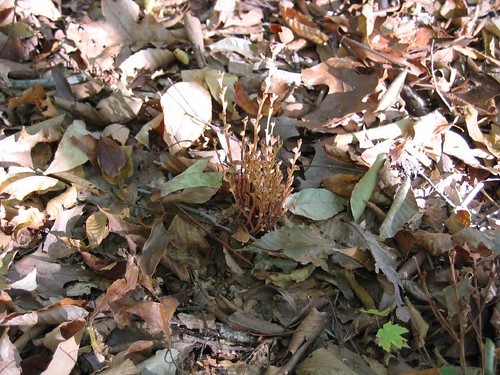
Epifagus virginiana, beech drops.
(*photo credit) March 3, 2012 Can We
Overthrow Nobility of Wealth Non-Violently?
On
National Anthem Day we hark back to our noble beginnings as a Republic
that involved a liberation from the oppression of an absolute monarch -- and the
accompanying nobility. At least that was what colonists thought in the heady
days of our 1776 Declaration of Independence. IS America's tinkering with
nobility dead? In reality, starting with early Hamiltonian merchants, and
continuing with clipper-shippers, railroaders, industrial magnets, business
managers, and on to bankers and fiscal manipulators of 21st century Wall Street,
we have developed a new nobility. Concentrated wealth replaced nobility of
blood. Now we suddenly awake and ask: Are these privileged billionaire
"Job-makers," or more precisely, Democracy-breakers?
At
the heart of our irritation is the fragile nature of democratic process, which
demands our constant minuteman-like vigilance. The right to bear arms really
means the right to defend our fragile democratic process through public word and
ready deed. Those reading this in distant lands realize that guarding democracy
is a global duty and privilege. Globalization of finances and hedge funds as
well as threats to our environment by an unregulated "free market" can make
democracy an endangered species. Bankers and financial investors dictate the
rise and fall of governments, all for the security of their ever so fragile
money system. Repression heightens as insecurity of the dysfunctional economic
system grows. However, Occupiers speak up for democracy.
Nobility
can become established through our inaction, through our acquiescence to a
system that never questions the right of billionaires, not to make money but to
retain vast amounts of wealth that is finite and belongs to all the people.
Private individuals do not have power by divine grace. What if we do not want
to play the Monopoly game with a few owning all the hotels? What if we
say the democratic spirit is to tax wealth and redistribute it through a more
answerable governmental system so that essential services become available to
all the people?
Nobility
was never meant to be part of the American system of democracy, even with an
imperfectly established Constitution. That compromised document allowed
landowners and slaveholders privileges but denied votes to the landless, women,
Afro-Americans and Native Americans. Gradually the slave was emancipated only
after an expenditure of immense struggle and rights extended through
amendments. Must constitutional change be required to liberate our nation from
the concentration of wealth in the hands of a nobility?
Non-violence
is our constant mantra. Ways must be found for liberation from this threatening
nobility that has its clutches on the throat of our nation. Symbolic actions by
Occupiers can only go so far. Let's return to the drawing board and develop
means to change a dysfunctional system so that democracy can flourish again.
Prayer:
Lord, teach us to act, but to do so non-violently.

Caterpillar of the monarch butterfly, Danaus plexippus.
(*photo credit)
March 4, 2012
Transfiguration Day and a New Heaven and New Earth
We
are called to be partners within Jesus' teaching and healing ministry, and in
his suffering, death, and resurrection. But through Transfiguration? We may
say that only Jesus celebrated such an event because he is greater than the Old
Testament prophets and lawgivers. As also a human being, Jesus needed the
consolation for the events of suffering and death before him. Is this the total
picture of Transfiguration or do we have a greater role than the spectators,
Peter, James and John?
What
is Transfiguration Day to us? We glory in the appearance of Jesus who is
to undergo great trials. Today, we share that glory through the eyes of faith.
How
do we participate in Transfiguration Day? First, Jesus glories in the
divine radiance and we are present with Peter, James and John -- but now as
participants. As the body of Christ we hope to share in that future, but to
some degree we share at this moment -- and this takes faith to perceive -- the
foreshadowing of eternal glory. We participate in that glory today, a true
consolation on our journey of faith. Thus, we also need consolation for our
Calvary when we enter into our final struggle of life. It will be God's mercy
and grace that will assist us.
How
do we extend Transfiguration Day to others? I recently read Mozart:
The Man and the Artist, as Revealed in His Own Words. The great composer
always intrigued me, and his sense of optimism and a child's freshness all
wrapped into the genius of composer and lover of music, family, and friends
comes over with utter delight. The glory of Mozart's sincere life extends in
space and time to us over two centuries later. The consolation of historic
exemplars triggers us to search in our families for relatives and friends who
are or were happy in their respective lives. They may not be artistic geniuses
but still have the unique talents of being caregivers who spread their God-given
gifts to others. Mozart's music and personal witness is an enduring
consolation. But all the more, so is Christ's. We are called to profess the
Good News.
How
is Transfiguration Day part of Earthhealing? We need consolation both as
individuals and as communities. Social consolation is a gift through
God's grace and is something that we find in comedians and happy, light-hearted
people, in those who smile and who have a caregiver's concern that does not end
in a day but somehow endures. This is the opposite of the threats, cajoling,
fire-and-brimstone people who see disaster around the corner. They (or we) see
it, but also see the glory of God's creation shining through in our world if we
must act as healers. Playing a positive rather than negative fearful influence
encourages a genuine gratitude for all our God-given gifts.
Prayer:
Lord, allow Transfiguration to shine through the shadows of negativism in our
world, and be a sign to us all that eternal glory stands before us -- our
eternal future.

Chernobyl Nuclear Power Plant.
By Mond (Own work) [CC-BY-SA-3.0 or GFDL], via Wikimedia Commons
March 5, 2012
Nuclear Energy's Current Fading Glory
A
year ago this month Japan experienced an earthquake and accompanying nuclear
disaster of major portions at Fukushima. In fact, areas around those damaged
power plants are still closed to inhabitants due to elevated levels of
radiation. The entire episode shook the world, but none more than the
unfortunate Japanese who counted on nuclear power of the peacetime atom. The
irony was that destructive atomic power was experienced by hundreds of thousands
in that country's Hiroshima and Nagasaki metropolitan areas in 1945. Was that
the unfortunate beginning of nuclear power's destructiveness that has not yet
experienced an ending?
In the United States the
total percentage of electricity generated from nuclear facilities has been
fading as renewable energy sources continue a dramatic rise. Also the capacity
for potential nuclear power generation is now in a marked decline on a global
basis. Worldwatch Institute states that from 2010 to 2011 the number of nuclear
power plants dropped from 441 to 433 (even though some new ones are still under
construction); the first ten months of 2011 saw the closing of 13 nuclear
reactors. Power generation capacity declined to 367 gigawatts in 2011 from 376
gigawatts at the end of 2010. Only four countries (Czech Republic, Romania,
Slovakia, and the United Kingdom) increased capacity between 2009 and 2010. The
nuclear share of "world commercial primary energy usage fell to around 5% in
2010" whereas it was at 6% at the beginning of the decade (Reference:
Sustainable Energy Coalition: SUN DAY Campaign, December 8, 2011).
Several factors are causing
the decline just reported:
a) Germany and other
countries are deeply concerned about nuclear power generation safety and this is
now a controversy within our American Nuclear Regulatory Agency. Other
anthropogenic safety issues include terrorist physical or cyber attack, or plant
personnel operating failure;
b)
Older power plants built in the heyday of nuclear development in the last half
of the 20th century have been extended from twenty to forty-and-more-year
license periods and the plants are showing signs of stress and wear after
decades of use;
c)
New powerplant sites or replacement components at existing power plants come
with escalating multi-billion dollar estimates; this comes at times of historic
cost overruns and startup delays that make electricity generating firms (and
investors) quite nervous. The capacity of wind alternatives can be expanded
with less money, fewer worries and in far quicker time from initial plant to
operation (see March first reflection); and
d)
What does anyone do with long-term waste materials?
Prayer: Lord, give this
world a sense of dangers from nuclear power, and help people to humbly see that
certain procedures are too costly and complex for human application.
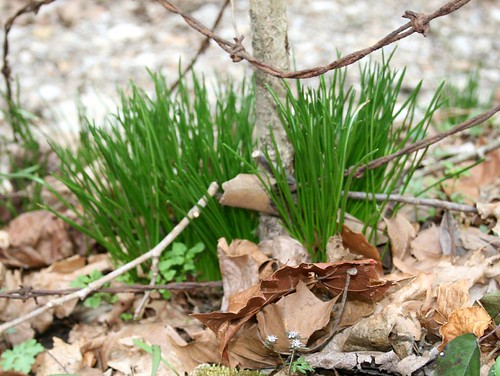
Tufts of wild chives growing along an abandoned farm fence in rural Kentucky.
(*photo credit)
March 6, 2012 Onions Are a True Spice
of Life
I was once standing in line
at a small store and noted the elderly man in front with only enough change
money to buy a few potatoes, but having to abandon his onion. I nodded to the
checker that I would pay, because I know how much a dish of potatoes with an
onion means to a hungry person. Not a customary gift on my part for I do not
recall a repeat of the event. I just felt I know how much an onion makes a
potato meal tastes good. Don't you agree? Last year people in India were
extremely disturbed over the rising price of onions. Onions and garlic are
nearly universal spices with exceptions of Inuits and other Arctic dwellers --
and I'm sure there are acquired tastes there as well. While the extra nutrition
of an onion can be disputed, its ability to add quality to cooking cannot be
disputed.
Why
onions in March? In part it is because this is the month I sow my spring
onion bulbs; these will bear somewhat in the season, remain dormant in the
summer, and return in wet cooler weather, and the remaining ones even grace the
following spring early crops. Note that onions should never be sowed near
similar-shaped but highly poisonous daffodil bulbs that could be mistakenly
eaten. I like onions and garlic for cooking at all times but prefer to pick
them fresh when possible.
Too
much onion taste. March is the month when the cows accidentally ingested
the fresh wild garlic shoots and gave a bad flavor to our milk to the point
where it could be rejected if we allowed the animals to range freely without
continuing some indoor winter feeding. Perhaps the taste of onions in milk is
regarded like onions on the breath, something worth avoiding.
Onions
as food ingredients are enjoyed but some find that they cannot be easily
digested. Biting into a pure onion causes me invariably to sneeze; others
including my father, said he liked raw onions but they did not like him. Polish
and other workers are known to devour raw onion sandwiches at lunch time. Yes,
raw onion sandwiches with some dressing can be delightful. In fact, when
seeking to take off a few pounds I often choose onions for a meal, for this
gives a feeling of a full stomach. Cooked onions can give flavor without such
harsh effects.
Be
onion sensitive. For salads, consider serving chopped onions as a side
dish. Realize that many others approach this food like they do peppers. Some
like them hot, some "sweet" or mild, and some like them but shun them because
the feelings are not reciprocal. Let's champion what we respect and what gives
quality (spice) to life. A world of pure essentials minus spice is not the
highest quality one. Most likely, the New Heaven and New Earth will include
onions and wild garlic.
Prayer:
Lord, allow us to see the quality of the spices of life, but not be so
intolerable as to impose them on others, unless they share in the same meal with
us.

Honey locust, Gleditsia triacanthos.
(*photo credit) March 7, 2012 Tax Havens
are Concentration Camps of Wealth
Why
such a title? Is it because tax havens really exist and flaunt the common
good? Monetary wealth puzzles us in many ways and so we ask questions. First,
"wealth" is vague in its definition, and so we have to confront a moving
target. Some primitive cultures would regard a collection of clam shells as
their form of "monetary gold," and the accumulation as being a sign of wealth.
Northwestern tribes regard the "wealthy" person as more capable of giving a
party in which many things are given away. And then there is the material and
uncontrolled "excessive" wealth of this modern age -- though excess is often in
the eye of the beholder. Difficulty in common definition does not make wealth
immune from critique. We can't take it with us.
A
second aspect of discussing wealth is how easily this can arouse an argument
over differing views. Those seeking tranquility may want to omit the subject;
those wanting more wealth may not want to appear too eager; those who like the
perks of wealth know about the difficulty of camels passing through the eyes of
a needle. I concede that if wealth makes for individual creativity or good work
to earn a sizeable sum, let it be so (if justly collected), for the acquiring or
collecting (as a tax collector) is not a misdeed as such; it is retaining wealth
by individuals or groups that makes wealth destructive through excessive control
over what is the common good. Why seek tax havens to retain the stuff?
The
trouble with retained wealth is a perceived sense of control and refusal to
share with others. Tax havens are "concentration camps" of wealth because the
money could be used to feed the poor, subsidize small farms, give health
benefits to those who lack them, furnish clean water to millions, build and
equip schools, and construct housing for a billion living in shanties and
slums. Allowing the rich to discover and retain these havens and legally use
them in the world of commerce manifests the dysfunctionality of this system that
cries to heaven for reform.
Some
might say don't be so harsh on the rich. Who is harsh in a world of
destitution? Without solidarity with those who are outraged by the disparity of
wealth we are party to the misdeeds resulting in retaining wealth. We can so
easily be discouraged that we fail the ones who need our encouragement most. We
fail them; we fail all the poor; ultimately we fail ourselves. How can we face
our merciful and just God if we neglect to require relinquishment of tax havens
that should be shared with the destitute, the hungry, the ill, and the
illiterate? How can we face our judge? Let's speak in the light of day, for
mortal darkness in a divided world is in the offing. In aging we discover an
ever-shrinking time span to speak, and thus urgency to address issues grows as
our own health, energy and resources diminish. Tax havens must not be merely
controlled: THEY MUST BE ABOLISHED.
Prayer:
Lord, give us the strength to speak out while we have the resources to do so --
for time is shortening for each of us.

Welcoming meteorological Spring awakenings!
(*photo credit)
March 8, 2012 Make
This a Flowering Year
We
like to champion flowers for these have a healing effect on our wounded Earth.
When sickness occurs, flowers are a special medicine through sight and smell;
they attract pollinators and us as well. Talking about new flower varieties is
possible, but for me it is more comfortable to promote traditional flowers:
1.
Expand a flower garden or mixed garden to include flowers of every
season. I have kept flowers in my garden amid vegetables: irises, marigolds,
begonias, lilies, and cosmos plants within the actual cultivated area -- and
these give color from spring through autumn. Adding more types will expand the
floral landscape, a growing and changing artistic scene.
2.
Refresh domestic interiors with flowering plants, whether from
greenhouses or homegrown. People who are sick or homebound deserve as much
floral color as we can afford to give.
3.
Increase indoor houseplants in the residence; they provide greenery (ivy
or parsley), rare color (Christmas cactus red blooms in December), and
deodorizing additional benefits. Share houseplants with others, especially
potted plants needing division to thrive and that cry out to be shared with
other growers.
4.
Consider hanging plants that can decorate porches, entrances, trellises,
and trees both outdoors and indoors.
5.
Promote flowers in public places. Economics are foremost in these
troubled times, but some small effort ought to be made with local governments to
keep gardeners (salaried or volunteers) attentive to the upkeep of public parks,
courthouse lawns, public roadsides, and traffic islands. Civic pride combines
with the consideration of resident and visitor appreciation.
6.
Exchange plants. My local herb club has special times in the year to
trade, give, sell, or buy surplus plants. I get some annuals that way, and hope
for more offerings in 2012. Also our festivals and fairs are good opportunities
for such exchanges.
7.
Consider edible landscaping. We might think that flowers are not
included, but some of the most beautiful blooms of the year come from fruit, nut
or other blossoming trees (e.g., black locusts), berry bushes, and even blooming
vegetables (garlic, potatoes, peas, etc.); these contribute to a colorful garden
landscape. One may desire to grow edible flowers, and that is not to be
denied. However, isn't their attraction of pollinators and their color not more
beneficial than making a meal of them?
8.
Decorate graves of forgotten heroes and heroines.
Prayer:
Lord, make all of us floral lovers and activists, seeing a value in beautifying
the world around us, and regard this as part of the healing process.
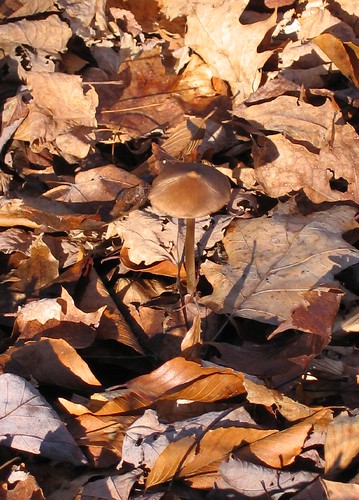
The camouflaged toadstool.
(*photo credit) March 9, 2012 Monitor,
Merrimac, and Aircraft Carriers
We
are in a Civil War remembrance period, for 150 years ago today the great battle
of the Federal Monitor and the South's Merrimac (Confederate
designated Virginia) occurred. Within a week the millennia of wooden
battle ships became obsolete by the advent of ironclad vessels. Both of these
premier ships were truly threatening. They fought each other to a five-hour
standstill off the coast of Hampton Roads, Virginia. The Merrimac was scuttled
later in the spring to prevent its capture, but at its initial appearance helped
changed the course of naval battles. The heroics of earlier sailors and marines
on ship were replaced by the heavily armed battleships and cruisers. The age of
duels by sword-wielding, rope-swinging attackers and defenders on bloody decks
drew to a close; unreal romantic battles gave way to reality.
Yet
even now this reality is not completely perceived. Battleships of a century ago
are museum pieces; ships-engaging-ships (outside of some Somali pirating
exploits) have not occurred for seven decades since Atlantic and Pacific Second
World War naval engagements. Such scenarios will most likely not return.
Certainly armed vessels are needed in the war on drugs and contraband, to fight
pirates, to act as hospital ships, and to help carry supplies to displaced
multitudes during natural disasters.
Part of the
romance-confronting-reality scenario is that the billions of dollars America
spends each year to sustain the largest navy in the world is utterly wasteful of
precious needed financial resources. The fueling stations for coal-burning
steamships of the nineteenth century are obsolete; heavily armed vessels under
the seas as nuclear-powered submarines are more a security risk by their very
presence; and then there are the massive multi-billion-dollar aircraft carriers
-- the floating bases on the high seas. WHY? WHY? To insist that we are numero
uno of the oceans, proud offspring of Britannia that once ruled the oceans? Why
fourteen US aircraft carriers, more than all the rest of the world put together
and even somewhat removed from today's drone warfare? Is it the jobs related to
the military/industrial complex that perpetuates the presence of these
monstrosities?
I
think back four decades when I served as an auxiliary chaplain at Great Lakes
Naval Base during the Vietnam War. There was still a strain of patriotism and
religious fervor recalling service to thousands of raw recruits in the 1960s.
My heart still stirs when a rendition of the Navy Hymn is sung on national
holiday weekends at Church. But is this residue of navy romanticism also
somewhat out of place in today's world? Why aircraft carriers and even a large
navy? Are we such slow learners from the futile battle of the Monitor and the
Merrimac 150 years ago? Let's turn away, for the spilled blood and guts of ten
thousand sea battles were never idyllic scenes. Hear the UK message: reduce the
navy.
Prayer:
Lord, teach us to use ships for fishing and transport and omit the expense of
bygone dreams of glory with armed ships.

Thrashing machine from a simpler time. Near St. Ignace, MI.
(*photo credit) March 10, 2012 Reflecting
on Clocked Time When "Springing Ahead"
Now in busy springtime we
are to lose an hour. Some of us dislike the time changes and advocate for one
or other, and to just stay with a single time throughout the year This,
however, will not be changed as rapidly as other aspects of the current economy,
and we may need more relevant causes. Still the Leap Ahead in spring
raises a few questions for reflection:
Why
are we such clock watchers? Perhaps the world of strict work, school,
worship, and entertainment schedules demands that we are conscious of the
precise time for starting or ending. Yes, we can get anxious about such matters
and suspect that others who are speaking lose track of their time as well -- or
forget that others deserve equal time for their own presentations. Watching a
clock then deals with fairness and concern about the limits of others who may
simply have to go to the rest room at the earliest opportunity. Perhaps clock
watching can be a sign of sensitivity and awareness of others' needs.
Can
we watch clocks too much? Have you observed folks who keep watching the
clock or his or her watch? They may have another appointment or they may be
extremely bored -- especially when they shake the watch to see whether it is
working. Stress can develop when we come to depend on clocks and watches all
the time. Maybe it is best to hide these devices on occasion and just live.
I recall a funeral when the other minister looked at his watch while preaching,
and this greatly insulted the congregation. One attendee told me that had it
not been for my presence, they would have ejected the preacher for clock
watching. Hence forth I do such things in a very circumspect manner.
Can
we judge time without clocks? Primitive societies did not have mechanical
time pieces, and many could estimate the approximate hour with great accuracy
through sunlight at a given season. Others were not time dependent and
considered the span as not being of utmost importance any more than their birth
years or birth days. In our modern culture we live by clocks and years. We
know that when events are enjoyable time flies and, when not so, time appears to
stand still. When we look back after an ever expanding span of previous
experiences, time seems to have been so short. When as youth, birthdays or
Christmases seem to never come. Our psychological experiences of time differ
widely since events come relatively faster with age.
Is
timing things beneficial whether by clock or calendar? This raises
questions about knowing events in our lives and in recalling special occasions
of loved ones. We need to remember and forgive those who forget. Some declare
independence from a clock -- to the benefit of all who know them.
Prayer:
Lord, help us to see time as your gift to us; we do not own or can even
master the short span of life. Help us to live in your good time and to
appreciate whatever amount you give us.
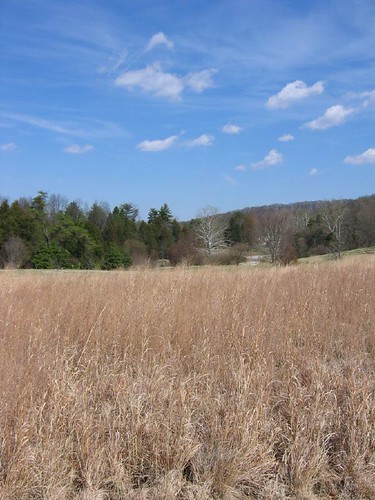
Bernheim Arboretum, prairie view in March.
(*photo credit) March 11, 2012 Have You
Ever Cleansed a Temple?
We
have in our parish a "Ministry of the Mop" that involves members who come and
vacuum the carpets and dust the pews -- but the question of cleansing has a more
social aspect to it. Few people on this Earth have cleansed any public place of
those who take from the commons. I admit that even though this is one of my
favorite Scripture passages, I have been remiss as well. Among billions of
professed Christians do any ever regard this as a duty?
If
we extend the reflection title to "Temple of Moneychangers" we still ask about
real moneychangers. A long while back our parish in Maysville, Kentucky had a
ten-cent section for visitors at collection time. My brother when returning
home sat in this section for lack of family pew space. He handed Chris Brown,
the Sunday collector, a quarter and dutifully got back a nickel and dime
change. At that week's special second collection he put in a second dime, and
was told to fork over the nickel, which Chris said he knew he had given him.
Mid-20th century moneychangers!
Jesus'
cleansing of the Temple is recorded in all four Gospels and was certainly a
seminal event -- for afterwards in all four Gospels the offended parties started
to plot to kill Jesus. To be Christian does not mean we have to pretend to act,
teach, dress, talk, or grow facial hair like our spiritual leader of 2000 years
ago. However, we must do similar things that would be in keeping with his words
and deeds by the prompting of the Holy Spirit. Through the Resurrection, all
things are renewed. The Holy Land extends to the entire planet redeemed in the
blood of Christ, and so the respect shown the Temple is not just reserved to
consecrated space in the Holy Land, or to certain churches or shrines; the whole
planet Earth is a redeemed holy land.
Jesus said that this sacred
space was meant for ALL the people; our planet is meant to be a place for ALL
the people, not the 1% privileged alone. A few in business or landholdings do
not have a right to control the entire space. Someone should speak up in public
places even beyond these humble reflections. This speaking up involves a 21st
century paradigmatic shift, one that has potential political and economic
consequences and the reasons so many of the established types (business,
academic, cultural) do not want to admit non-elite ALL who make legitimate
commons claims.
One
sub-set of Occupiers focuses on taking over foreclosed residences and allow
those living there to continue their residing. Another and more daring one is
to encourage homeless folks to move in as squatters to abandoned or foreclosed
properties. Amid difficulties that such practices may bring, there is the
message that property rights are quite secondary, while proper lodging is a
primary right even in a materialistic age. Teaching the material-minded about
property rights is difficult.
Prayer:
Lord, give us the courage to cleanse the temple of sequestering common space --
a challenge in a propertied world.

Flower of the 'Ichi Ki Kei Jiro' variety of non-astringent persimmon.
(*photo credit)
March 12, 2012 Select and
Plant a Variety of Fruit and Nut Trees
Our
readership is global and selecting specific fruit and nut varieties depends on
climate and locations. A laundry list of what we like has limited application.
However, championing variety without specific selection still has the following
qualities:
a)
Variety is good; it is a taste of the fruit and nuts and not a commercial
quantity that we are talking about. If you want to start an orchard, go to
another information source. This reflection is on the value of having close at
hand a number of fruit and nut types for quality enjoyment. Most of us have
experienced a harvest oversupply; we hesitate to waste good food and so strive
to give away or preserve excess produce.
b)
Variety means careful selection. We pick up a tree catalog or go to a
garden supply sales room and discover a host of varieties to select from. The
multitude of selections and their enticing photographs cause us to panic. Which
one should we choose for they all look good in the photos? Maybe we ought to
increase our purchase in self-assurance that some will be productive.
c)
Variety may demand several of a kind. A fair number of tree varieties
demand others in the vicinity in order to have successful cross pollination.
Sometimes we make the mistake of placing one tree of a kind when several are
needed, so we must attend to the written or oral advice and descriptions.
d)
Variety adds beauty to the landscape. Granted, an orchard with many
apples is an appealing sight. So are landscapes with fruit and nut trees of
variety for they bloom, leaf, and produce at different times and thus appeal to
our aesthetic senses.
e) Variety is a teaching
tool. This may look beyond selecting and planting to a tree-bearing stage.
The good part about variety is that, in sharing the produce, others through
direct experience find it easier to decide what to plant.
f)
Variety is ecologically sound. This is true for various reasons:
monocultures attract and encourage certain pests in large numbers and these need
pest control; produce of some types will occur on and off with seasons and tree
type; variety opens us to finding and treasuring heirloom strains with their own
unique qualities; variety limits the type of pest attack and encourages
organically grown produce; and this planting seeks to counter damage to the
current threatened global tree population.
g)
Variety affords simple joys. The commercial world today dictates our
tastes and preferences to mass produced and singular types and tastes -- often
laced with pesticides. Home-grown fruit and nuts are special and unique and add
to our joy in eating.
Prayer:
Lord, teach us to see the richness in all of creation, and to assist others in
coming to this appreciation of your works.

Viewing a red sunrise.
(*photo credit)
March 13, 2012
Should We Be Silent When Attacked?
Silence is golden, but not always. I prefer the principle that I should be
silent when personally attacked, whether justly or unjustly. At one time a
major business association went to our diocese center and asked them to silence
me -- from what I gathered, due to my environmental stance. I could have spoken
with speed, and publicity. However, I dismissed the happening and let it pass,
but should I have acted differently?
Followers of Jesus should speak up when another is attacked, but
ought we to follow him and remain silent when personal attacks are leveled at
us? Down through the centuries many have been accused yet acted in different
fashions as the Spirit moved them. St. Paul made a public defense; he appealed
the attack on him to Caesar and thus was transported to Rome for trial.
Distinctions may be required when dealing with personal attacks on one's
integrity, writings, or actions.
However, our public work has a social dimension; the personal
attack on one's community service could be (depending on circumstances) an
attack on the entire community -- the poor, the locality, the larger whole Body
of Christ. Thus the circumstances and nature of the attack must be considered.
If the assault is intended to undermine a broader community of which one is a
member, public defense is for the greater good. If the attacker is not directly
attacking a larger body, then silence may truly be golden.
The leaders based the argument to crucify Jesus on the community's
welfare, "it is better that one should die..." a supposedly shared good. It was
obviously a false argument but is a type of reasoning made by many throughout
history. We could say that falsehood has been made against individuals before
and that here personal silence (as practiced by many in periods of persecutions)
may still be that of public witnesses speaking by their presence more than by
their words.
However, what if the argument was not against an individual but
the group in which he or she is a member -- and that all of these will suffer
equally or even worse than the one being accused? Personal is transformed into
public defense and this is a demand and not an option. We must speak up for
others whether such is effective or not. In such a case, then the defense of the
other takes precedent even if it includes directed it at an individual target.
This seems so obvious, but is it?
Situations make a difference. Will others be hurt by my silence?
Will unforeseen ramifications result from an uninformed media or the spread of
rumors which we have only a limited ability to address. Silence truly is
golden, but on occasion speech may be platinum. Let's weigh each case. Maybe I
should have spoken up.
Prayer:
Lord, give us the power of discernment, when we are to speak and when we are to
remain silent in a hostile world.

Murky waters of Kentucky creek following heavy March rains.
(*photo credit)
March 14, 2012
Flood Tide
About a century ago when Grandma wore huge hats and
Grandpa waxed his mustache, loads of rich folks took the "waters."
On the other end of that money spectrum,
in the hills and hollers of these parts, waters implied --
flood tide.
Waters can be saving, healing, fire-fighting, or crop-sucking.
Waters give surging life or a moment's drowning death.
Trickling creeks soothe the bones, but rain drops on a tin
roof make a child afraid, whose mommy died --
at flood tide.
I quake in rainy weather in this narrow soggy valley
when the weatherman calls for two more inches.
We stir ourselves and bring out garden truck and tools,
because they can't outride --
flood tide.
And we feel the helpless stillness all around,
but listen, that distant roar tells us the earth's gone wild,
and when raging foam hits the road bank and sweeps across the
blacktop at breathless speed, it can't be denied --
it's flood tide.
We feel a sense of blessing for being on high ground,
and then awhile later we wonder about dwellers downstream,
who may be sleeping through the radio or the siren.
and never hear when neighbors cry --
flood tide.
It brings back other swollen river stories.
Daddy saw coffins floating down the Ohio in '37,
and waved goodbye to some noted deceased citizens
on their last free ride --
during flood tide.
Flood waters shift streams' meandering courses,
they break down mountains, mud up dales.
They write in indelible strokes the words, "Po folks,"
as though a mark of pride --
in flood tide.
The channel's liquid yoyo is up and down, up and finally down,
and now that promised faint overhead rainbow.
Nothing's left but diapers in trees and empty milk jugs
or "Kentucky ducks" and mucky riverside --
after flood tide.
Prayer:
Lord give us the courage to expect flooding; help us to prepare those who are
most vulnerable to escape the threats and damage that comes all too suddenly at
flood tide.
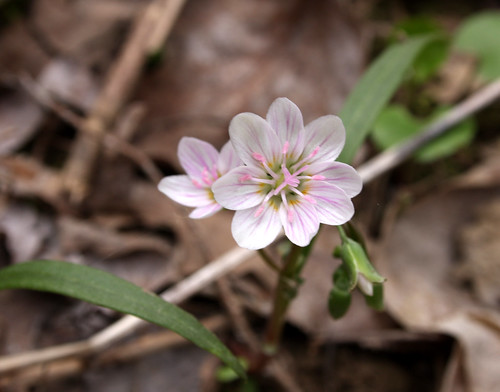
Early March sighting of spring beauty, Claytonia virginica.
(*photo credit)
March 15, 2012
Green Cement: Reducing Climate Change Gases
Cement is the world's most popular processed building material: 3.6 billion tons
per year and rising with the building booms of Asia and other developing areas.
The versatility of traditional cement has been long recognized (Romans two
millennia ago used volcanic ash and other ingredients to make an enduring
concrete for binding materials in the Pantheon). Basic cement materials are
readily available and the product in a wet condition and mixed with other
ingredients can be molded in a variety of strong rock-like forms and binding
materials. However, producing cement is very energy intensive and gives off
about 5% of the global anthropogenic carbon dioxide (CO2)
emissions. These emissions result from fossil fuel combustion in processing and
from basic limestone emitting CO2
through the heating process at very high temperatures (2,600 degrees
Fahrenheit).
Efforts are underway to make "green cement," that is,
processes requiring less fossil fuel consumption in processing or which uses
materials that reduce or even eliminate CO2
emissions. Some of these processes separate out the
CO2,
capture it, and keep it out of the atmosphere; this can be a costly procedure
and has not been fully perfected as mentioned in previous Reflections. Other
approaches include replacing limestone with other readily available starting
materials, though skeptics have long said it would be at the sacrifice of
strength of the final concrete product. One alternative is to use what is called
a "geopolymer" made from fly ash, sodium hydroxide and potassium hydroxide. The
basic ingredient is not only available as a waste needing proper storage but a
major worrisome byproduct of burning coal (see August 2, 2010, "Coal Ash: What
Is a Greener Solution").
Another green approach is to mix Portland cement and a
limestone substitute, namely, relatively cheap and available magnesium
compounds. These materials need to be heated to about half the temperature of
the traditional cement processes and can use less environmentally-impacting
biomass fuel (e.g., wood) to reach processing levels. However, available
magnesium carbonate originally chosen also releases quite sizeable quantities of
CO2.
Other readily available magnesium minerals (silicates) offer greater promise
along with mixtures of magnesium carbonate itself that is made from other
magnesium compounds and thus have CO2
negative impacts. Exact ingredients are trade secrets. Another green cement
approach is to mix powerplant-emitted CO2
with sea water brine to produce a carbonate that could be a precursor of cement.
Limestone is replaced in this process, though this is still a research idea and
not at commercial production stage In fact, if such substitutes using excess
CO2
or fly ash provide a high quality concrete final product, one says "more power
to the R&D folks." Reference: Smithsonian, Dec. 2011, pp. 53-56.
Prayer: Lord, we pray for research people to be successful in creating
less polluting building materials for the good of all.

A hand-sewn Appalachian quilt.
(*photo credit)
March 16, 2012
Quilting Day: Social, Art, Utility, and Creativity
Quilting Day
(celebrated tomorrow) is an opportunity to celebrate in Appalachia and elsewhere
the "Patchquilt," a bed cover of artistic design. This beautiful piece of craft
work uses worn clothing for patches in specific traditional or local patterns.
Thus, within this definition are several of the enduring characteristics of
Appalachia that are worth emphasizing: neighborliness, art, utility, and
creativity.
Cooperative quiltingng
has been a social function within the region, for many times the womenfolks
gather as at a party (or "bee") and engage in a cooperative project while
socializing as neighbors. Much as other forms of work were opportunities for
busy people to multitask, so is quilting; this has proved to encourage a party
atmosphere in the long history of this art form.
Artistic quilts
are made with enormous care by individuals working together for a common or
locally specific design or arrangement of the patches and outlines of the
quilt. The patterns are what give a sense of true art as well as the colors of
the patches saved and utilized for the anticipated product. These hand-stitched
masterpieces take much time and are often so valuable that they are used for
tapestries or wall hangings by purchasers. The quality of the stitching can be
highly prized.
Utilized quilts
are still found in many places, for the original intent was to keep sleepers
warm on winter night. Quilting material is also used for clothing, especially
by those enduring cold climates. Quilt insulating value is enhanced by proper
fillers (wool, cotton, or various synthetic materials).
Creative quilts
are where utility meets art in the skills of the artisans. Some common patterns
of quilt design have been known for decades, still the creative juices of
artisans flow in many ways such as matching and contrasting colors of the
patches. Artistic recycling and reuse share a deep Appalachian tradition that
is often combined with story-telling and involve
Ballad Quilting
(stories in pictures framed within the quilt with scraps of cloth, braid, and
lightly colored embroidery).
Window insulating quilts
are rolled coverings attached to interior of window frames that have quilted
material with colorful patterns. These can be elevated or lowered in winter to
allow in sunlight or to preserve the heat within the room space.
Barns
painted in colorful and artistic patterns have appeared on at least two thousand
structures in the past decade, not only in Appalachia but now in at least two
dozen American states. These combine the celebration of quilting design and
color with that of the highlighted heritage and unique barn architecture
present.
Prayer:
Lord, allow us to see opportunities to be useful and creative, and to do this in
an artistic and neighborly manner.

Sorrel from a home-greenhouse window.
(*photo credit)
March 17, 2012
Light-Hearted Irish and Troubled Times
Find reason to laugh; it's characteristic of courage.
The late John Klug of West Virginia
Tomorrow is winter's final Sunday after a long season that
requires courage and patience to endure. How can the Irish and others laugh
amid troubles of every sort from weather to natural disaster, from financial
ruin to Church troubles, from evaporating housing assets to domestic concerns?
A litany for desolation could fill a book and yet some can skip over to
merriment and humor, for we must not take ourselves too seriously. In many
ways, the Irish are a chosen race given to laugh when others of us are tempted
to cry.
Lightheartedness is a quality that makes for enduring our troubles
knowing that God is in charge. We trust that we are not to endure more than we
can handle. We simply do God's works in the field of a troubled world. In
fact, our smallness before God taken with a sense of humor may be the very
medicine that each of us needs to be bearable to all around us. The
long-suffering, humorless person is pitied and considered by many to verge on or
is sick. Such is not a whole person filled with gratitude; rather, it is a
complainer who lacks natural grace and the qualities needed to be an Earthhealer.
Certainly, healing demands serious moments but these must be balanced (human
ecology) by lighter moments.
My home parish (St. Patrick's in Maysville, KY) was a speck of Irish green amid
serious, no nonsense English and Germans. The Irish made one of their last
Celtic stands. In our grade school play 70 years ago today I had to appear on
the stage wearing a tall green hat and speaking with an Irish brogue, and
everyone knowing my Germanic background roared in laughter, -- an utter surprise
to me. How could opening my mouth create such mirth? It remained a puzzle for
a long time, since I only said one or more sentences. The exact words are
forgotten, for memorizing was never my forte. So much for St. Patrick's Days.
Many Irish attempt to avoid being pretentious, superior, or stuffy. None of us
is perfect; none above others; none deserving of extra privileges. Today's
Irish see their homeland in financial troubles with some of the most depressed
housing and real estate prices. But nothing should stop some time off for
parties, laughter, jokes, and stories. The merriment of a
St. Patrick's Day
says something about an enduring culture: wear the green proudly; belittle bad
times; prepare for the spring sunlight next week; and find joy in this Sunday's
Scriptural readings. Take a break and enjoy the weekend. We are too tied down
to the plows of life; we need to see that God smiles and takes pleasure in human
beings. The Irish seem to know this better than others of us. Seriously!
Prayer:
Lord, teach us who are too serious to follow the Irish and be lighthearted.
Teach us to lighten up and do so with a smile -- even when we are remiss to show
our missing teeth.

Young cedar amongst wild garden growth.
(*photo credit)
March 18, 2012
Calvary's Cross and Laetare Sunday
Just as Moses lifted up the serpent in the desert,
so must the Son of Man be lifted up,
that all who believe
may have eternal life in him.
(John
3: 14)
In Lent, we are seeking to render our hearts and fundamentally change our way of
acting, a
Metanoia.
We are asked to look upon the cross and find the suffering Jesus in a Calvary
that includes us here today. Sometimes we wonder whether we would have the
courage to stand with Mary and John at the foot of Calvary's cross and actually
take our own cross with Jesus. Open affirmation means accepting our cross, our
participation in the Calvary event. We are called to peel back darkness and
become lighthearted, for Easter is just around the corner.
In the Gospel story today (John 3:14-21) Nicodemus (a learned person) comes to
Jesus by night knowing that it is difficult to present himself in front of peers
during daylight hours. He has courage, but only so much. Others, especially
sinners and the ill, find a public forum to be of little consequence when they
want to approach Jesus -- they are more open to their real condition. With
time, Nicodemus grows in courage; at first he wants to talk theology and have a
meeting of minds, but Jesus insists on a meeting of hearts, something far
deeper. Later, in John 7: 50-51, Nicodemus defends Jesus, the accused Galilean,
against his fellow Pharisees, for he is in process of becoming a believer.
Recall that Nicodemus comes to Calvary (John 19:39) and takes the dead Jesus
down from the cross with Joseph of Arimathea for burial.
In the Old Testament (Numbers 21: 4-9), Moses is instructed by God
to have a bronze serpent raised before the afflicted people. Whoever looks upon
it is saved. Here and in the Nicodemus story the raising of Christ on the cross
foreshadows our salvation, for whoever looks upon this instrument of ignominy
with reverence and repentance is saved through the graces of the Lord. However,
as a people on the road to our goal, we must do more than stand motionless
before the cross. We have to take up OUR crosses and follow him, and this takes
effort. We share with him being lifted up and made public according to our
unpopular moral, social, and environmental issues. Derision targeted at Jesus
is directed at us too; we join Jesus in a Calvary extended in space and time.
Laetare Sunday
calls us to discover the hidden joy found in the call to suffer with the Lord.
In obeying God will and finding with Mary and others a sense of joy in being
with God, we enter even amid troubles into an event that includes the
Resurrection. We
know that victory is here, and yet we must be willing to undertake the joyful
struggle to reach eternal life.
Prayer:
Lord, give us courage to speak out when speaking is necessary at home, at work,
or in the public forum. Help us, Lord, to face criticism and yet be patient,
civil, and kind.

New fungal growths on living tree.
(*photo credit)
March 19, 2012
Democratic Principles and the Church
On the feast of
St. Joseph
we ought to see in this year of evangelization how we can make the Church more
presentable to the unchurched. In becoming more presentable, how can we apply
democratic principles to Church life? This is not merely attempting to apply
secular political practice to church settings -- for all democratic process
needs improvement. An ideal goal is to make democracy work so that the Church
can become a beacon for changing a dysfunctional economic and political order.
Local attitudinal change:
"We are church" is an attitude that is only gradually taking hold today. As
laypeople have to rise to the occasion and fill in depleted clerical ranks, many
are seeing that responsibility goes beyond being examples of moral living; it
includes the way we see ourselves as Church members. Democratic process demands
participation at all levels of action, and subsidiarity in the Church works best
at a local level.
Spiritual democracy:
We often see ourselves gazing at saints from a distance and hope to imitate
their noble lives. What does imitation mean except to immerse ourselves in
issues around us and pray for the guidance to act properly? The glory is before
us, not only beyond us in time and space.
Clerical attitudinal change:
This is deliberately not the first item of change because I am convinced that
the multitudes must change at the grassroots level before we can get clerical
change at "higher levels." Change comes slowly through recent public exposures
of imperfections for better or worse. The clergy sees itself today in a far
more realistic manner than even a few decades ago. Aristocratic ways and a
comfortable paternalism give way to democratic listening and cooperative
teamwork.
Power structure changes:
Democracy issues often crop up in such issues as women in the Church (see
Special Issue on
Priests for Equality
on
this website), married clergy (bring on the Anglican Ordinariate), and perhaps
an expanded deaconate for the entire Church and not just a heavily American
practice. Perhaps down the road will be the return to the early Church practice
of electing bishops by popular consent. A problem of politics ought to be
avoided and so election of higher officials may be best done through
representative democracy of those elected locally.
Nobility of all gifts:
The work of the Church as one is through seeing all gifts of individuals as of
equal worth. A priest's role is not more noble, only perhaps more essential
with regards to certain functions. Health care and teaching are also essential
in a different way. The call is to see the essential role of ALL as worthwhile
ministry: praying, administrating, healing, teaching, constructing, and manual
working.
Prayer:
Lord, teach us to treat our evangelical teamwork as a joint calling in being
bearers of Good News to a troubled world.

Reflecting by water's edge on the Equinox.
(*photo credit)
March 20, 2012
Spring Equinox: Fine Time to Shine
Adherents of natural and traditional religions can join hands
today in a joint celebration of outliving the winter and preparing for the
blessings of the upcoming season. With lengthening days and strengthening
sunlight we stir in this and various ways:
Beat the Heat
Bless all the Rest
Cheer with those Near
Chill with the Bill
Croon the Tone
Dance at the Chance
Dare to Scare
Dine with Wine
Dress like the Rest
-- Maybe --
Eat the Treat
Fight for the Right
Fly ever so High
Glance for the Chance
Go with the Flow
Greet the Feat
Hear with each Ear
Hop with the Mop
Love things Above
Make the Break
Place in the Race
Pray for the Day
Read the Deed
Ride the Tide
Rock the Clock
Roll with the Soul
Row with the Tow
Run for Fun
Shake with the Quake
Shine On-line
Shop till you -- Stop!
Sing in the Spring
Smile Awhile
Sow the Row
Spice the Rice
Surf for the Mirth
Quell the Spell
Take the Cake
Tame the Game
Try to stay Dry
Turn the Stern
Unite the Polite
Walk the Talk
Write down the Site
Zone the Phone
... and more in store
Prayer:
Lord give me more important things to do.
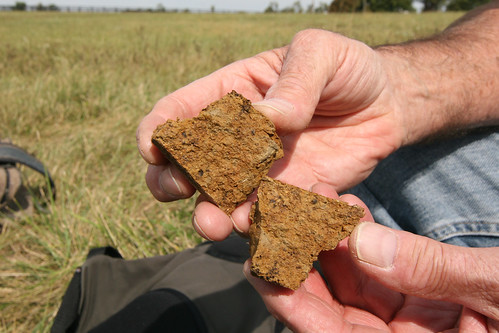
Farmer examines a clod of soil. Fayette Co., KY.
(*photo credit) March 21, 2012
Garden Spadework: The Act of Turning Soil
During
Art Week
we all must encourage those who paint, carve, write poetry or weave -- and
rightly so. But one could extend arts to the manual types and consider the
spade as much of an instrument of art as the paintbrush. This very humble spade
has been used to make hasty trenches and foxholes in wartime, fill sandbags and
reinforce embankments in floods, and turn the sod for the grave of a loved one.
Spades have had noble purposes and we ought to treat this instrument with
respect.
Choose a sturdy tool.
Far better if you are inclined to spade by hand make sure you invest in a sturdy
instrument. Yard sales maybe a place to get a bargain or be willing to pay
three times the cheaper prices at a higher grade hardware store. Otherwise the
spade will simply wrinkle at the first dig.
Make spading a thorough exercise.
Beware; it takes a good back and muscles! Be willing to adapt the proper
posture, standing straight and letting legs and arm muscles do the work. A bad
back may defer the actual spading operation and here direction to a youth eager
for some employment may be more desirous. Okay!
Determine the cultivated space.
Don't overdo the spatial amount to be tilled this year. My new garden addition
will be about 4 by 25 feet or 100 square feet of garden space (about 30 square
meters). Believe me, with careful planning this can grow a fair amount of two
to three crops this year. If you have energy to spare and good physique, then
try more, but always be prudent.
Construct raised beds.
I
learned the secret of a "double dug" raised-bed garden the hard way: through
experience. The method prescribed by some who want to till and sweat is to dig
a layer and then a deeper layer through trenches and placing of upturned soil in
proper order. Mine is a simpler method. Don't make the beds too far apart (say
two foot for four-foot-wide beds). First dig the four-foot bed as far as you
wish and then take a foot deep of soil from both sides of the bed and pile it
into the interior of the new tilled bed. Thus the path is lowered eight inches
and the bed itself is raised to about a half of a foot of loose soil. Obviously
this is better done on slightly sloping terrain where soil is well-drained. Now
if you desire, cover the path with discarded rugs, straw, sawdust, or other
cover.
Time spading properly.
Spadework is saved for a day when you yearn to exert energy, when in good
health, when the weather is right, and the sharp winds allayed. An ideal time
is limited and so we may have to give on one or other condition. The important
thing is to touch the Earth and be healed in doing so.
Prayer:
Lord, make the spade an avenue to making a better world through the sweat of our
brow and the use of our muscles; help see the nobility that comes in manual work
and to do as much as possible on our own -- yet deferring to others when needed.

A Polish heirloom chair, a Grandmother's treasure.
(*photo credit) March 22, 2012
Heirlooms, Legacy Materials, and Junk
As we age, we ponder wills and to whom to pass heirlooms and other things we
hold more dear than others do. It is not easy to think of our passing, our
final personal Calvary event, and yet it is inevitable and worthy of rare but
occasional reflection. We simply won't live forever. A few in a creative burst
decide the wording of a tombstone, something that is a legacy that is at the
mercy of acid rain and moss coverings.
Heirlooms?
Material things pass and pass on to others; they are not immortally grasped. In
a world that values material possessions, the great handicap is always how to
maintain it in a state of preservation by dependable guardians -- perpetual
caretakers if such exist. I recall my maiden Aunt
Toots
(yes, on her tombstone) who took great pains in seeing that her priceless
heirloom dishes, silverware, and other valuables went to one or other favorite
relative who would value keepsakes and remember the donor. I have tried to pass
on family items and gifts to various nieces and nephews thinking that their
remembrance of sources will extend long past a limited and short life span.
Heirlooms feature mortality's clever twists and turns; we are not masters of our
future or our possessions. Spiritual treasures are eternal, for love alone is
an eternal heirloom.
Goods or Junk?
Each of us can chuckle when we hear that experts puzzle whether a piece of art
is authentic or fake. What does it matter that one piece is worth a million
dollars and its virtual look-alike is worthless? Where is the origin of that
evaluation, except among a peer group that sets values on the possessing as much
as the possession? After Thomas Aquinas was granted a peek into the heavenly
scene he wanted to burn his writings as though they were straw. Thank heavens,
for the sake of posterity that did not occur. Great artists destroyed works and
famous people burned personal letters. The shovel and trash heap became the
repository of many great relics of the past, though some for the sake of history
survived.
Legacy
may have something to do with passing on. As Billy Graham says in
Nearing Home: Life, Faith and Finishing Well,
we must prepare for our passing and help others to do the same. In my pastoral
experience, I discover some who pass away with flying colors of gratitude and
kindness, and some who appear to stumble in the act of letting go of
possessions. I recall one on her deathbed constantly gazing at her jewelry.
Every time I discard personal letters and notes I feel somewhat relieved that
another person does not have the duty of pitching them after I am departed.
Ideally anything of worth should be routed to responsible preservers or
legitimate archives, but amount is limited and we have to help set the limits.
I resolved in 2012 to toss a little each week so the burden will not be great on
those who clean up leftovers.
Prayer:
Lord, teach us what is of value in this passing world. Give us a sense of value
of love as a true legacy.

Fully-spiced pumpkin pies.
(*photo credit) March 23, 2012
Spices and Herbs Make for Quality of Life
An herb is the friend of physicians and the praise of cooks.
Charlemagne
Champion quality.
Do our spices go beyond salt and pepper shakers? Quality in food is not only
through cooks but in cook's spices used in right amounts at proper times. Spice
adds flavor to a dull life and that has been known since prehistoric times with
seed and leaf traces unearthed to prove that primitive peoples used herbs in
their cooking. My only spice in social life is attending the local "Garden
Thyme Herb Club." This permits a vista into the multitude of herbal
possibilities. Variety itself is its own spice of life, and quality of life is
a sure ingredient to proper healing -- and thus the friend of physicians and
caregivers and Earthhealers.
Know trade history.
Amazingly, we tend to forget that Columbus was seeking a shorter route to
precious and profitable spices of the East (e.g., pepper, cinnamon, nutmeg,
etc.). In fact, some of these spices were regarded as money in Medieval times,
because of the value average and wealthy people placed on distant spices with
exotic tastes. The closing of the traditional Middle East routes by the fall of
Constantinople to the Turks in 1453, led the Portuguese to discover an
alternative route around Africa within a few decades. Spanish competition for
an alternative spice route by going due west across the Atlantic motivated
Columbus and subsequent conquistadors at the end of that century as well.
Spices influenced the drive to globalization.
Be creative.
Spices have so many uses: culinary, medicinal, food preservatives, pest
repellents, deodorants, and cosmetics -- and uses still undiscovered. Spices
pack a wallop of benefits. They are natural products and generally cultivated
organically; they do deteriorate in potency and need to be replaced (but that
shelf life differs with type), and they often can be mixed with others and add
unique additional flavors. For those of us who do not usually adhere to
recipes, the field is wide open for new creations; often we cannot really
reproduce these unless we take detailed notes, and that isn't fun! People talk
about combinations of herbs and spices for meats, fish, and various vegetables
and thus creative cooks are open to a host of possibilities.
Experiment patiently.
Herb use does not come in a day. The glory of our herb club is that no one is
so elite to think she or he knows it all. Expertise is fairly evenly shared and
all have a gift of listening to the story of others. With herbs and spices,
there is so much to learn that we all feel like novices either in growing,
preserving, or using them. People who like herbs learn to have a growing area
close by the kitchen (even pots within the house), so that the fresh herbs can
be quickly harvested for immediate use in cooking.
Prayer:
Lord,
give us the wisdom to see that spices are part of our life, and they prepare us
for one to come.
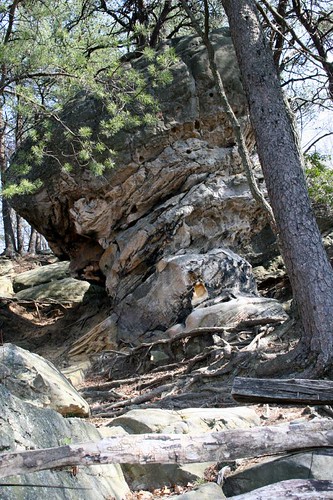
A chimney rock formation. Bell Co., KY.
(*photo credit)
March 24, 2012
The Fallacy of Leaving Job Creation to the Rich
A misunderstanding is about in this election year that the wealthy
are the job creators -- and in some cases that is true. However, they do NOT
change their creative urges by paying their fair share of taxes and no
substantive research exists to show this is true. The rich often ensure the
legislator's job. National Public Radio investigators sought out examples of
those in small business who "needed" lower tax rates to create jobs and could
unearth no such people. In most cases the myth that tax rates should favor
wealthy job-creators is fabricated for the benefit of the wealthy, who in many
instances need an honest manual job.
All people ought to work for a livelihood and special attention ought to be
given to job-seekers rather than job-creators, though entrepreneurs can fill
both categories. In a world of small farmers, crafters, and shopkeepers,
workers attempt to create their own jobs and livelihood through ingenuity and
hard work. With the industrial revolution, multitudes abandoned farms and shops
and moved to find steady work in urban areas -- thus sacrificing their
self-employment for higher security as employees. Thus the class of employer
with power and employees at their mercy became all the more established. Not
all unemployed are forthright enough to seek honest work, but the majority of
people are anxious to work for a livelihood. Those seeking honest work and not
able to find it become disgruntled, the underclass.
Governments are major employers for services ranging from
maintaining public roads to running schools. As preservers of the right to all
for a livelihood, the government is the employer of last resort. With so much
infrastructure needing upkeep, job possibilities are plentiful; however, actual
resources for the carrying out of these forms of employment are limited due to
lack of revenues. Governments have the duty to raise revenues and ought to when
unemployment cannot be corrected in the private sector. However, if the
privileged have distorted the democratic process and have undue influence on
legislators, then potential revenues are left undemanded and uncollected. The
situation becomes ever more perverse and untenable when disparity of wealth
results in control of financial resources and legislators by the wealthy.
Wealth left in private hands in hopes of creating jobs could be a
very bad omen if they decide to shuttle taxable resources to unreachable tax
havens. They become purveyors of a cult of permanent privilege, where they
decide who are employees and can gain a livelihood, and who stands in the
charity line. Cult stability means providing minimal essentials to keep people
alive and some, unfortunately, prefer handouts to honest work. However, if you
don't work you don't eat, says St. Paul. Active government in justice needs to
provide work for the unemployed, work requirements for the workers, and revenue
for the operations.
Prayer:
Lord, help us be just, to give all their work opportunities but to be fair in
who is to do the giving.
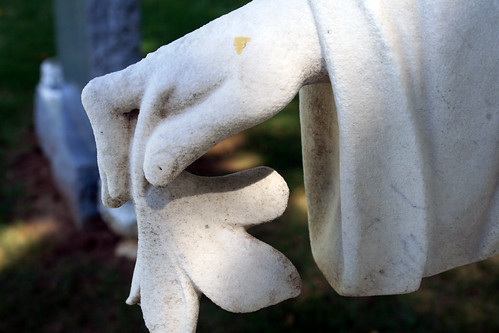
Delicate pose from sculptor's hand.
(*photo credit)
March 25, 2012
Dying to Self in Order to Rise Again
If a grain of wheat falls to the ground and dies, it produces much
fruit.
(John 12:20-33)
In our life journeys we discover many people who are
self-sacrificing and give their lives working for others. Saint Theresa of
Lisieux, the "Little Flower," prayed to God that if she was not able in her
short mortal life to be as active as she would have liked, could she at least be
so in heaven. Her prayers were answered in wonders and miracles, and this
little virtually unknown nun was declared a doctor of the Church. She, who was
hardly known within her community due to being bed-ridden, has become one of the
most popular modern saints. Her autobiography is the most popular in the world
and printed in 30 languages. She died willingly with the Lord in Baptism,
religious life in a convent, and in her sickness that incapacitated her by
secular mobility standards.
Dying to self is a scary thing when we first learn about the
calling. We humans share in self-preservation, something instinctive for all
living and sensate creatures. Maybe martyrs are able to overcome that instinct
through willingness to serve God in special ways -- and that often applies to
soldiers as well. As a French commander in the
Grande Armie
said on the road to Moscow in 1812 when told to charge in the middle of a
withering cannonade, "Let us all go to our death." That is dying to self in
one way.
Jesus approaches hostile forces in Jerusalem along with his impending suffering
and death with determination; he tells his disciples that each follower must be
open to sacrifice by giving our lives for a greater cause, namely following
him. His disciples are to resolve to do so for the Lord, to imitate the grain's
dying to become a fruitful harvest; the blood of martyrs is called the seed of
the Church. That seed results from a heart-felt sacrifice on their part. The
prophet Jeremiah says that God will write the law on our hearts (31:31-34). The
law of self-sacrifice is written onto the hearts of those who love God allowing
them to die to self; with this comes the solemn assurance of a new and better
eternal life. God's covenant promise is intertwined in that bond of love. We
await that fulfillment with anticipation but only when accompanied by the
willingness to die to self.
Our call is to sacrifice with Jesus on a Calvary event that is
extended in space and time. Jesus dies for and with us and we, in turn, as
baptized, are to die to sin and be with him. We are asked to give up worldly
attachments that tempt us to forego sacrifice in order to be nearer Jesus,
especially in this season of Lent. We go down with him in death so we can rise
with him in eternal life. Thus, the Calvary of our own life comes before the
resurrection to eternal life. We are approaching the great feast of Easter when
we celebrate the event of Jesus' rising and promise of ours as well.
Prayer:
Lord, make us self-sacrificing, a smile on our face and joy in our heart, as we
prepare for this and an eternal Easter.
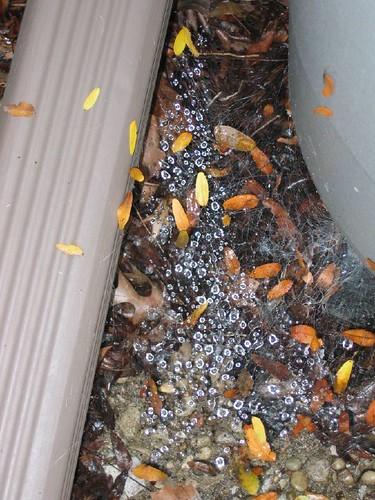
Jewel-like dew-drops formed in mass of spider webs.
(*photo credit)
March 26, 2012
Annunciation Day and Dewfall
Send victory like a dew you heavens, and let the clouds rain it
down. Let the earth open for salvation to spring up. Let deliverance, too, bud
forth which I, YHWH, shall create.
(Isaiah 45:8)
Canon Two of the revised Liturgy wording is more formal, causing
some of us to stumble. The word "dewfall" touches us deeply, for dew is so
mysterious, so gentle, and so precious.
Dewtime
is when drops don't freeze to frost or remain in clouds that obscure
visibility. Dew is the moisture that keeps the plants and animals refreshed
during the growing season. Dew is condensation and yet the moisture is all
around; it is a divine gift most cherished by so many creatures for nourishment
and growth. Dewtime is the time of salvation, the eternal NOW.
Dewfall is gently dramatic.
The song goes, "Morning has broken...like the first dewfall on the first
grass." Dewfall is announced with no blowing trumpet or rushing rain, but with
the gentleness of an alighting dove. It's quiet; its drama is in its effect.
The annunciation is the world's most dramatic event, and yet it occurs in the
quiet of Mary's dwelling with no other human being knowing of its occurrence.
God's greatest manifestations are dewfalls, not hurricanes. Dewfalling is like
sunrises. Science says it is condensation and not a "fall," but we discover
beyond explanations a spiritual meaning expressed in poetic terms.
Dewdrops are precious
for they come in an instant and express their beauty, and then quietly
evaporate. Our salvation is that precious moment in world history when the
jewel is seen in its full beauty. During a meditative moment right after
sunrise decades ago I looked down and saw a transparent emerald; no, a bright
sapphire; no, a blazing ruby; no, a fleeting topaz; no, a dewdrop jewel soon to
evaporate seen from different angles. Ever so precious is the moment of
Christ's coming. The Annunciation event was a dewfall moment in Mary's life
when her simple "yes" filled the universe.
Dew
is both heavenly and earthly. The Messiah is God-man, and on this
Annunciation Day
Earth and heaven kiss. Through God's grace salvation has come and then become a
participative endeavor involving first Mary and then, in God's good time, us as
well. We are somehow here at the Annunciation not by what we deserve but by
what God gives to us. Jesus comes as Messiah and becomes God's immediate
presence to and for us and for all creation -- people, plants and animals and
the universe itself. However, we act as the voice of God bringing Good News and
the hands of God in helping renew our troubled world. God is author; we are the
scribes in our writing good deeds. We become "sprung hope" for others,
hastening the coming of the New Heaven and New Earth in word and deed.
Prayer:
Lord, help us to see the full impact of the Annunciation event in our lives as
healers of our Earth, and let us see it symbolized by a dewfall.
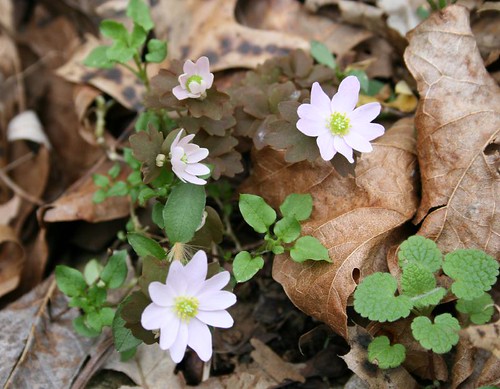
Rue anemone, Anemonella thalictroides.
(*photo credit)
March 27, 2012
Limit TV Time: Instead Read, Pray, and Reflect
Television can be good or bad depending on what is watched and for how long (I
only watch TV about an hour a year and that is nearly too much). The average
American leaves the TV on about five hours a day, or longer than all surveyed (I
do not say civilized) nations. Perhaps even though the set is on, it may not be
watched attentively during such a massive span of time.
TV's beneficial side
includes some public interest programs that allow people to view the expressions
and reactions of candidates for office, or to take part in current or past
events in ways that mere imagination does not allow. Certainly one can know
people better by seeing how they respond to questions and speak on certain
issues. Also at times of historic moment (death of a famous person, etc.) or in
special factual programming, an audience can feel being present in a virtual
manner. Furthermore, some entertainment is healthy and wholesome -- but only
some
and in a limited amount lest valuable time for reading is wasted.
TV's detrimental side
should not be overlooked. People cease speaking to others in their family when
all eyes turn to the TV. The center of attention in a home becomes a screen
presenting personalities from a distance, not the person at one's side. When
the habit is to watch TV day after day, viewers find this easier than to take
the effort to read materials. TV viewers can become part of a generation of
functionally illiterate; they learned how to read but do not do so as they sit
passively allowing others to fill their minds with canned comments, sound bites
and critiques.
Limiting TV times for ourselves or those under our charge is a
sound Lenten practice and ought to be extended throughout the year. No one
needs the severe limits I impose on myself, but I would not read a book a week
or more frequently if there were enticing TV shows every evening or during free
time. In place of these, one ought to find other worthwhile occupations such as
periods of meditation and prayer, times for reading either on the electronic
media or through paper editions, or simply spend time conversing with loved ones
and neighbors. In many ways, phone talkers can be annoyances to co-residents
unless shunted to a special place, but phone talking is more social than TV
watching.
One final remark. I can invariably pick out excessive TV watchers
by talking on virtually any subject for a few minutes. The TV generally gives a
shallow overview of current events. After a half-hour conversing with this
person, I can estimate the amount of time the person watches TV -- though
TV-watching is like smoking habits and does not tell how deep the intake is;
some doze during TV viewing or multi-task with other practices such as cooking,
cleaning, eating, or quilting.
Prayer:
Lord, teach us to be respectful of our time, to see it as a gift that can
include an opening to distant media, but must show a preference for the social
and religious dimensions of life.

Rushing Kentucky stream.
(*photo credit)
March 28, 2012
Spring Housecleaning Covers Many Areas
Spring breezes and elevated temperatures make us want to air out
winter clothes and fetch summer ones, store away snow shovels and deicing
materials, and remove vestiges of snowstorms. All too often, we overly focus on
one or other messy situation close at hand and forget that housecleaning
involves many aspects.
Domestic scene:
We begin spring cleaning at home; our residences need it, and starting here
opens the way for airing the house on warm March days. However, domestic
housecleaning takes time, cleaning agents, and elbow "grease."
Personal effects:
Airing out home extends to clothing and then the personal accumulation of goods
gathered over time; the personal litter beckoning us to cleanup all aspects of
life. Reserve some time; fetch the recycling containers; sort out the unwanted
correspondence and papers; gather the unneeded bottles and boxes; sort through
the unworn clothing for the nearby basement sale or charity drive. Let's
liberate ourselves from unwanted items.
Business site:
While in the cleanup mode extend this to reorganizing office space so that more
needed articles are near at hand, quotes well posted, papers in order, and books
properly arranged. A day of office rearrangement is well-spent in early
springtime.
Landscape debris:
Winter snows have a way of covering the misdeeds of winter and all the previous
year. This is the time to prune fruit trees, cut away escaping vines, turn the
compost pile, and bring order to a budding edible landscape.
Spiritual garden:
Lent
is a time to put our spiritual house in order, to review and confess our faults,
and to prepare for Easter's glory with a cleansed and purified heart. Some say
they already have heart; true, but does it need housecleaning?
Acquired attitudes:
Too often winter weather makes us irritable and hardened in attitudes about
migrants, health care, taxes, drug problems, and on and on. Some issues
irritate us and cold weather allows them to fester. A good walk outdoors and
some positive reflection may rid us of such irritants.
Political space:
Officeholders ought to be held accountable, but many of us would rather leave
the political scene to experts who have more insight, savvy, or perseverance.
Monitoring and connecting with candidates may be a part of our political
housecleaning that is well worth our springtime review in 2012.
Prayer:
Lord, give us the energy to engage in all aspects of housecleaning as we prepare
for the Holy Week starting this weekend. Give us a spirit of openness and the
energy to act accordingly in all matters as we prepare for Easter.
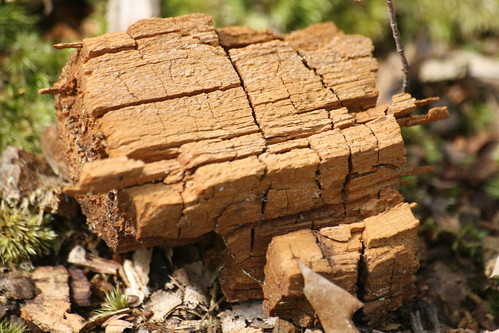
Interesting patterns in decaying wood, species undetermined.
(*photo credit)
March 29, 2012
Global Climate Change Paralysis: A Moral Dilemma
Is the failure of national and international agencies to address
the complex issue of climate change a paralysis resulting from moral weakness on
the part of problem deniers? Does this go deep in a culture that denies
individual faults, and blames all misdeeds on others? Is there an expanding of
this moral dilemma to larger aggregates of people whether in close community or
not?
Two issues converged when first writing on this topic: one was the
conclusion of the unsuccessful Durban Climate Change Conference with an American
speaker being ejected for calling on our US Congress to take meaningful action;
the second was my reading of the book by science historians Naomi Oreskes and
Erik Conway,
Merchants of Doubt
(Bloomsbury Press). The first was the cry of the utterly distressed who have
little effect even as an American citizen on a reluctant Congress; the second
was the history of a group of scientists not experts on the specific subject in
the pay first of tobacco companies and then of Big Energy and other
corporations. Contrarians (often the same groups) have strived to obstruct fair
consideration of scientific evidence of cancer caused by smoking and more
recently to humanly-caused climate change.
Current scientific evidence points directly to anthropogenic climate change.
This is a new effect occurring in world history -- the power of human
technological power to misuse resources without regard to consequences. In a
great part this is due to free market forces that simply avoid negative
externalities when not required by governmental agencies. The "negative"
involves pollution effects from emissions and waste materials; the "externality"
is outside the pricing range of the production and sales of consumer goods. The
manufacturers do not pay all external costs, and extra profits result from
irresponsible practices.
The issue of climate change involves scientific evidence coupled with prudential
insight to adjust consumption policies at various levels, and to address
inevitable predicted results. The time window to escape drastic climate change
is narrowing rapidly. Realistic changes were proposed at the 1997 Kyoto
Protocol and accepted initially by 32 mainly EU nations, but omitted by
developing nations (including major emerging CO2
emitters China and India) and never accepted by the US (the primary 1990s
emitter). The 2011 conference yielded the "Durban Platform for Enhanced Action"
that calls for implementation and ratification of a binding agreement at a
targeted date of 2020. In the US, binding programs are being blocked by Big
Energy and funded think tanks contrary to current scientific evidence (see
Merchants of Doubt).
The dire legacy of our consumer culture and resulting deliberate "free market"
paralysis is experienced in floods, droughts, submerging island nations,
endangered species, and disappearing glaciers.
Prayer:
Lord, encourage us to confront the paralysis facing our world, and to do
something about it by acting now.

Visiting a small Woodford County, KY, family farm.
(*photo credit)
March 30, 2012
Agribusiness Versus Today's Small Farmers
In most countries it is the unjust distribution of land which is at the root of
poverty of small farmers.
(G.D. Guillot and F.F. Such. Agro-Industry Under Suspicion,
CJ Booklets
# 142, p. 5)
In 2001, a report by the International Fund for Agricultural
Development (IFAD) claimed that three-fourths of people living in hunger live in
rural areas, and most are small farmers. In the past decade we have witnessed
mass migrations in Africa and other places to urban areas and refugee camps.
Focusing on the plight of these small farmers and their improved condition is
key to confronting world hunger problems. Improvement of rural roads, access to
farming equipment and fertilizer, establishing dependable markets and fair trade
practices, and removing unfair advantages of richer nations would help stabilize
small farm production problems.
Surprising to many, along with the issues just mentioned, lack of
land is the hidden small-farm problem: in Guatemala 2.36% of landowners control
65.1% of land and 88% of farmers have only 16% of cultivable land. This unjust
pattern is in many Latin American, Asian, and African countries as well. Making
matters worse is that food security pressures are pushing land-short emerging
countries (with access to sovereign funds) to buy up farmland in poorer lands
where small farmers have subsisted for millennia. Cooperating and paid off home
governments push out small farmers to consolidate large tracts for commercial
crops (grain, sugar, soybeans. etc.) to be shipped to distant lands. Recall
that in the 1840s Irish famine corn was being shipped from large Irish estates
to England. In many places small farmers lack organizational skills and power
to protect their lands.
The green revolution with many touted good effects has only
exacerbated the problems for smaller farmers who lack the resources to compete
with large landholders. Delocalization of production results from globalized
practices of concentrated capital investment and policies promoting commercial
export crops and agri-business farming practices. GNP statistics when
summarized do not tell the plight of small farmers and their lack of influence,
a modern form of colonization with new actors on the stage.
What can be done? Are attempts to curb transgenic seed sales by
Monsanto and other major corporations coming too late? How can the plight of
small farmers at the mercy of global agri-business be publicized and addressed?
Solidarity through rural organizing to defend small farmers is one answer that
has a chance; fair trade programs to bring items to another country by
eliminating middle people may be another; loans and grants and rural road
building through governmental assistance is another; systematic redistribution
of farm land may be the most important and yet many governments are distracted
by other economic issues.
Prayer:
Lord, give us an understanding of what must be done to save the world's small
farmers, and search for ways to assist them.

Abulelita's favorite primrose.
(*photo credit)
March 31, 2012
Migrants Need a Fighting Chance
You must not molest or oppress the stranger, for you were once
foreigners yourselves in the land of Egypt.
(Exodus 22:20)
On
Cesar Chavez Day,
a welcome ought to be on our lips for migrants willing at low wages to do
difficult tasks that many Americans find back-breaking. Last year, when Alabama
put in its strict immigration requirements, many migrants (illegal or otherwise)
in shock and fear left the state, and immediately tomato farmers with harvests
ready for picking found themselves without laborers. Many of the long-time
unemployed considered the farm work too difficult, and thus quit soon after
entering the fields. If anti-migrant laws and requirements were found to be
upheld by the courts, some major food crises will develop. Honestly, migrants
(often illegal ones) are the backbone of our food production system. They are
willing to work, pay taxes, and abide by the law. They deserve welcome,
protection and respect.
Depending on how far back we go, we are all immigrants in this
fair land -- some freely coming and some arriving on slaveships. No matter how
long after arrival, we have no absolute ownership of this land for it belongs to
God, not we mortals on our earthly journey. Saying this, we do not have to
present a totally open door policy. In this election year with varying opinions
on illegal migrants (some eleven million illegals are estimated to be in our
land) we need a position somewhere in between blanket amnesty and mass
deportation; the first is too lenient and entices others to come; the second is
too ruthless and uproots law-abiding and tax-paying people who are part of the
local communities and have children and grandchildren who are American
citizens. Can fairness be found that honors many and yet treats all fairly?
When migrants hold legitimate and necessary occupations that
others find too difficult, these ought to have priority green cards leading to
citizenship, for their honest work has awarded them a "welcome guest" position.
If, on the other hand, someone comes who is part of a drug network, this person
is not welcome and deserves deportation. We honor hard work by law-abiding
migrants.
It is the duty of each of us with charity in our hearts to realize that migrants
are preyed upon; they are often lured to this country with little or no promise
of a social support system. Most often undocumented workers are at the mercy of
employers and a hostile community. Much of our American affordable food prices
result thanks to working migrants -- uninsured, hidden, ill-housed, but deeply
wanting a better life for their loved ones. National and international policies
are critically needed both to control migration and to be fair and just to all
parties who are presently in our land. Those here honorably deserve to have
their work considered as credit and their presence welcomed.
Prayer:
Give
us, Lord, a sense of hospitality. Keep us away from vindictive ways to our
working migrant guests, legal or not. |